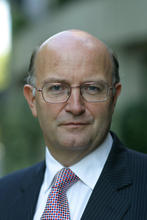 Roger Bootle is one of the City of London’s best-known economists. In addition to running Capital Economics, which he founded in 1999, Roger is also a Specialist Adviser to the House of Commons Treasury Committee and an Honorary Fellow of the Institute of Actuaries.
Roger Bootle is one of the City of London’s best-known economists. In addition to running Capital Economics, which he founded in 1999, Roger is also a Specialist Adviser to the House of Commons Treasury Committee and an Honorary Fellow of the Institute of Actuaries.He was formerly Group Chief Economist of HSBC and, under the previous Conservative Government; he was appointed one of the Chancellor’s Panel of Independent Economic Advisers, the so-called “Wise Men’. In 2012, Roger and his team from Capital Economics won the Wolfson Prize, the second biggest prize in Economics after the Nobel.
Roger Bootle studied at Oxford University and then became a Lecturer in Economics at St Anne’s College, Oxford. Most of his subsequent career has been spent in the City of London.
Roger has written many articles and several books on monetary economics. His latest book, The Trouble with Europe analyses what has gone wrong with the EU and what needs to be done to put it right. This follows The Trouble with Markets, which analyses the deep causes of the recent financial crisis and discusses the threats to capitalism arising from it. Like his previous book, Money for Nothing, which correctly anticipated the financial crisis, it has been widely acclaimed. This followed the success of The Death of Inflation, (1996), which became a best-seller and was translated into nine languages. Roger is joint author of Theory of Money and author of Index-Linked Gilts.
Roger appears frequently on television and radio and is also a regular columnist for The Daily Telegraph.
In The Comment Awards 2012 he was named Economics Commentator of the Year.
Roger is a much sought after speaker at conferences and business gatherings worldwide. He has a long and distinguished record of successful forecasting of major events and market movements, often contrasting with the prevailing orthodoxy of the time, including:
- Perceiving that before the Great Recession real estate markets were caught up in a bubble
- Foreseeing the serious impact of the credit crunch
- Forecasting the collapse of the dotcom boom
- Seeing that the UK would be forced out of the ERM in 1992 and, in contrast to the official Treasury line and the views of most forecasters, predicting that inflation and interest rates would fall
- Forecasting that rising inflation would prompt UK interest rates to be raised to 15% in 1989
- Realising that during the “hard monetarist” phase in 1979-81, inflation was going to fall sharply despite the fact the broad money supply was growing rapidly
- And most famously, predicting as early as October 1990, that the financial climate in Europe and North America would be transformed by sustained low inflation – and maintaining this view even though many people in the markets dismissed The Death of Inflation as a joke
